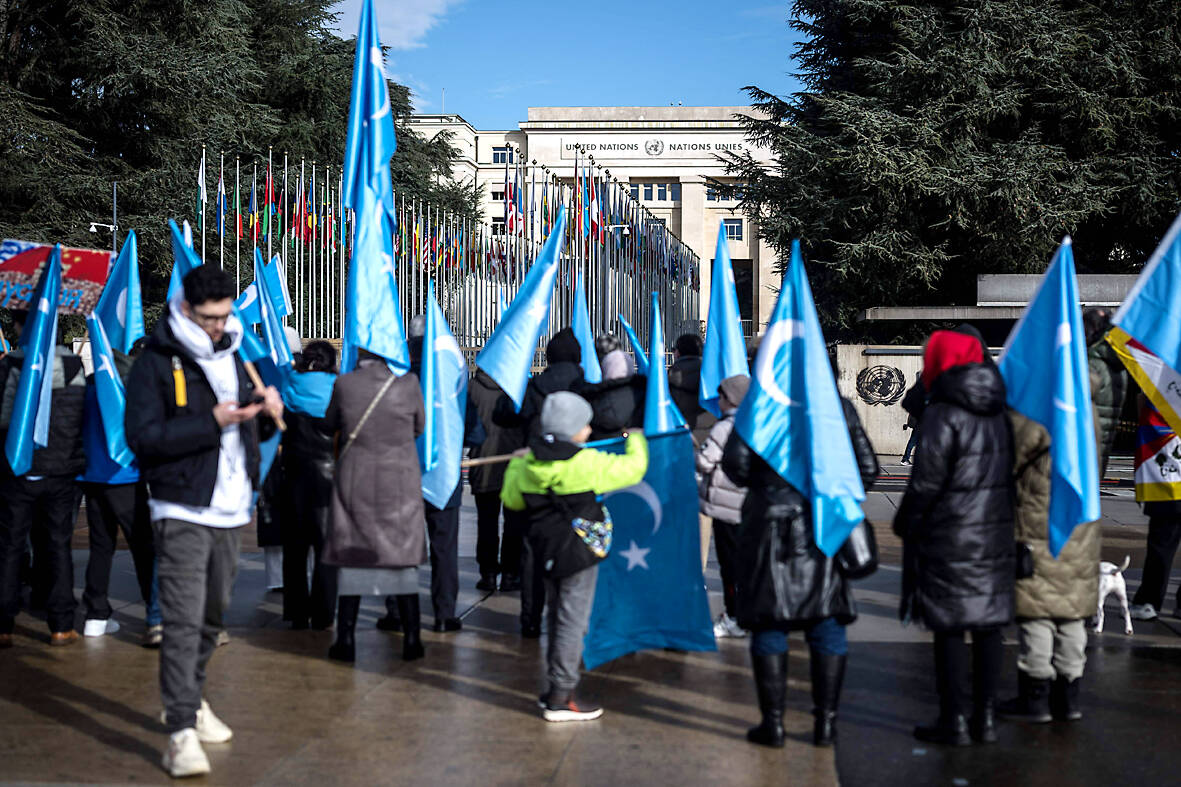Hundreds of thousands of Uighur female religious leaders are estimated to have been arrested and imprisoned in Xinjiang since 2014, with some elderly women detained for practices that took place decades ago, according to an analysis of leaked Chinese police files.
There is growing evidence of the abusive treatment of the Uighur Muslim population of the north-west Chinese region of Xinjiang, with their traditions and religion seen as evidence of extremism and separatism.
New analysis of leaked police files found more than 400 women — some more than 80 years old — were sentenced by Chinese police for wearing religious clothing and acquiring or spreading religious knowledge. Most were sentenced for studying the Koran, said researchers from the US-based Uyghur Human Rights Project, who used analysis of the files to extrapolate that hundreds of thousands of women were likely to have been detained, in total.

Photo: AFP
In 2017, Patihan Imin, 70, was sentenced to six years in prison. Her “crimes” included studying the Koran between April and May 1967, wearing conservative religious dress between 2005 and 2014 and keeping an electronic Koran reader at home.
Another woman, Ezizgul Memet, was charged with illegally studying scripture with her mother for three days “in or around” February 1976, when she was just five or six years old. She was detained on 6 July 2017 and sentenced to 10 years in prison.
The police files were initially published in 2022 by several media outlets, including the BBC, but this is the first time the treatment of Uighur female religious leaders has been analyzed by researchers. Previous testimony from women confined in camps in Xinjiang revealed they have allegedly been subjected to forced sterilization, abortion, sexual assault and marriage by the Chinese government.
Other charges included wearing “illegal religious clothing”, purchasing or keeping religious books at home, attending “illegal religious gatherings,” and even organizing a wedding without music — which is officially seen as a sign of religious extremism, the report said.
The longest recorded sentence was given to Aytila Rozi, 35, who received 20 years for learning to read the Koran while working in inner China in 2007, as well as teaching and studying the Koran with a small group of women between 2009 and 2011.
In China, state narratives have portrayed Uighur women who acted as religious figures in the community as “dupes of religious extremism,” but researchers say religion is an important vehicle for female agency and expression in Uighur communities.
Rachel Harris, professor of ethnomusicology at Soas University of London and co-author of the new report, said the ustaz (urban female leaders who embraced reformist styles of Islam coming from the Middle East in the 1980s) used religion to pursue education and participate in international trade. Meanwhile, the buwi (female religious leaders primarily in rural Uighur communities) held significant power in society, and were responsible for leading birth and death rituals, teaching children and overseeing women’s religious and cultural activities.
“The government narrative was that women needed to be liberated from religious oppression. They really took that [agency] away in the name of liberating women,” said Harris.
While the ustaz still play a prominent role among the Uyghur diaspora, few buwi traditions have survived, said Harris.
“The culture of the buwi, including their poetry and songs and religious gatherings, that’s been repressed and suppressed,” she said.
The report comes as the UK, US and other countries condemned Beijing’s treatment of Uighur in a rare scrutiny of the country’s human rights record at the UN last week. The UK called on Beijing to “cease the persecution and arbitrary detention of Uighur and Tibetans and allow genuine freedom of religion or belief and cultural expression.”
In response, China’s UN ambassador Chen Xu (陳旭) said the concerns were caused by “misunderstanding or misinformation,” and that “a few countries groundlessly accuse and smear China, based not on facts but on ideological bias and unfounded rumors and lies.”

Late last month Philippines Foreign Affairs Secretary Theresa Lazaro told the Philippine Senate that the nation has sufficient funds to evacuate the nearly 170,000 Filipino residents in Taiwan, 84 percent of whom are migrant workers, in the event of war. Agencies have been exploring evacuation scenarios since early this year, she said. She also observed that since the Philippines has only limited ships, the government is consulting security agencies for alternatives. Filipinos are a distant third in overall migrant worker population. Indonesia has over 248,000 workers, followed by roughly 240,000 Vietnamese. It should be noted that there are another 170,000

Hannah Liao (廖宸萱) recalls the harassment she experienced on dating apps, an experience that left her frightened and disgusted. “I’ve tried some voice-based dating apps,” the 30-year-old says. “Right away, some guys would say things like, ‘Wanna talk dirty?’ or ‘Wanna suck my d**k?’” she says. Liao’s story is not unique. Ministry of Health and Welfare statistics show a more than 50 percent rise in sexual assault cases related to online encounters over the past five years. In 2023 alone, women comprised 7,698 of the 9,413 reported victims. Faced with a dating landscape that can feel more predatory than promising, many in

“This is one of those rare bits of TikTok fitness advice with a lot of truth behind it,” says Bethan Crouse, performance nutritionist at Loughborough University. “Sometimes it’s taken a bit too literally, though! You see people chugging protein drinks as they’re scanning out of their gym.” Crouse recommends the athletes she works with consume 20-30g of protein within 30-60 minutes of finishing a resistance training session. “The act of exercising our muscles increases the breakdown of muscle proteins,” she says. “In order to restore, or hopefully improve them — and get gains such as increased muscle mass or strength —

“Far from being a rock or island … it turns out that the best metaphor to describe the human body is ‘sponge.’ We’re permeable,” write Rick Smith and Bruce Lourie in their book Slow Death By Rubber Duck: The Secret Danger of Everyday Things. While the permeability of our cells is key to being alive, it also means we absorb more potentially harmful substances than we realize. Studies have found a number of chemical residues in human breast milk, urine and water systems. Many of them are endocrine disruptors, which can interfere with the body’s natural hormones. “They can mimic, block